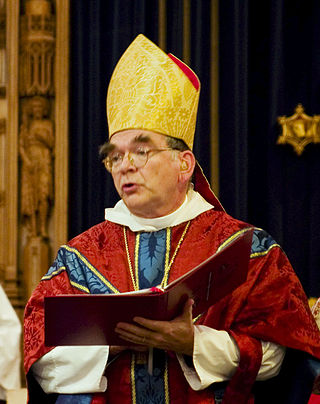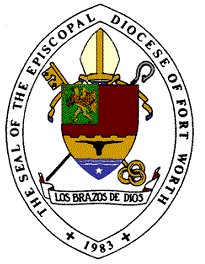
The Church of Nigeria is the Anglican church in Nigeria. It is the second-largest province in the Anglican Communion, as measured by baptised membership, after the Church of England. As of 2016 it gives its membership as "over 18 million", out of a total Nigerian population of 190 million. It is "effectively the largest province in the Communion." As measured by active membership, the Church of Nigeria has nearly 2 million active baptised members. According to a study published by Cambridge University Press in the Journal of Anglican Studies, there are between 4.94 and 11.74 million Anglicans in Nigeria. The Church of Nigeria is the largest Anglican province on the continent of Africa, accounting for 41.7% of Anglicans in Sub-Saharan Africa, and is "probably the first [largest within the Anglican Communion] in terms of active members."

Robert William Duncan is an American Anglican bishop. He was the first primate and archbishop of the Anglican Church in North America (ACNA) from June 2009 to June 2014. In 1997, he was elected bishop of the Episcopal Diocese of Pittsburgh. In 2008, a majority of the diocesan convention voted to leave the diocese and the Episcopal Church and, in October 2009, named their new church the Anglican Diocese of Pittsburgh. Duncan served as bishop for the new Anglican diocese until 10 September 2016 upon the installation of his successor, Jim Hobby.

The Episcopal Church in North Texas was a diocese of the Episcopal Church from 1982 to its merger with the Diocese of Texas in 2022. The diocese included a geographic area of 24 counties in the north central part of Texas. As of 2021, it includes 13 churches, including a number of other congregations in the process of reorganization. The jurisdiction was the site of a major schism in 2008. This schism was the result of the diocese's bishop, Jack Iker, leading the majority of clergy and parishes to join the Anglican Church of North America as the Episcopal Diocese of Fort Worth. The Episcopal Church diocese is headquartered in Fort Worth, Texas. It announced on April 22, 2022, that it would seek reunion with the Episcopal Diocese of Texas. The merger was finalized by the 80th General Convention of the Episcopal Church in the United States of America on July 11, 2022.

The Reformed Episcopal Church (REC) is an Anglican church of evangelical Episcopalian heritage. It was founded in 1873 in New York City by George David Cummins, a former bishop of the Protestant Episcopal Church.

The Anglican Diocese of Quincy is a member of the Anglican Church in North America and is made up of 32 congregations, principally in Illinois but also in Wisconsin, Minnesota, Texas, Iowa, Nebraska, Missouri, Hawai'i, Colorado, Tennessee, and Florida in the United States. The diocese was a founding member of the Anglican Church in North America in 2009.
In the United States, the history of the Episcopal Church has its origins in the Church of England, a church which stresses its continuity with the ancient Western church and claims to maintain apostolic succession. Its close links to the Crown led to its reorganization on an independent basis in the 1780s. In the nineteenth and early twentieth centuries, it was characterized sociologically by a disproportionately large number of high status Americans as well as English immigrants; for example, more than a quarter of all presidents of the United States have been Episcopalians. Although it was not among the leading participants of the abolitionist movement in the early 19th century, by the early 20th century its social engagement had increased to the point that it was an important participant in the Social Gospel movement, though it never provided much support for the Prohibitionist movement. Like other mainline churches in the United States, its membership decreased from the 1960s. This was also a period in which the church took a more open attitude on the role of women and toward homosexuality, while engaging in liturgical revision parallel to that of the Roman Catholic Church in the post Vatican II era.

The Episcopal Missionary Church (EMC) is a Continuing Anglican church body in the United States and a member of the Federation of Anglican Churches in the Americas.
The Anglican realignment is a movement among some Anglicans to align themselves under new or alternative oversight within or outside the Anglican Communion. This movement is primarily active in parts of the Episcopal Church in the United States and the Anglican Church of Canada. Two of the major events that contributed to the movement were the 2002 decision of the Diocese of New Westminster in Canada to authorise a rite of blessing for same-sex unions, and the nomination of two openly gay priests in 2003 to become bishops. Jeffrey John, an openly gay priest with a long-time partner, was appointed to be the next Bishop of Reading in the Church of England and the General Convention of the Episcopal Church ratified the election of Gene Robinson, an openly gay non-celibate man, as Bishop of New Hampshire. Jeffrey John ultimately declined the appointment due to pressure.
The Anglican Diocese of San Joaquin (ADSJ) is a diocese in the Anglican Church in North America (ACNA). It came into being after a majority of congregants in the Episcopal Diocese of San Joaquin separated from the Episcopal Church in 2007. Prior to the separation, the Episcopal Church diocese was one of the most conservative in the church, and one of three that did not ordain women. The Anglican diocese is now headquartered in Fresno. The pre-separation diocese had a membership of approximately 8,500.

The Anglican Church in North America (ACNA) is a Christian denomination in the Anglican tradition in the United States and Canada. It also includes ten congregations in Mexico, two mission churches in Guatemala, and a missionary diocese in Cuba. Headquartered in Ambridge, Pennsylvania, the church reported 977 congregations and 124,999 members in 2022. The first archbishop of the ACNA was Robert Duncan, who was succeeded by Foley Beach in 2014.

The Episcopal Diocese of Fort Worth is a diocese of the Anglican Church in North America. The diocese comprises 56 congregations and its headquarters are in Fort Worth, Texas.

Charles Wallis Ohl Jr. was the Provisional Bishop of Fort Worth in The Episcopal Church. Jack Iker had been the Bishop of Fort Worth in the Episcopal Church until a super-majority of the diocese voted to dissolve its union with the General Convention at the 2007 and 2008 diocesan conventions. Those members of the diocese who wished to remain in the Episcopal Church met in a special convention on February 7, 2009. Edwin F. Gulick Jr., the Bishop of Kentucky who was planning to retire soon, was appointed as Provisional Bishop. In November 2009, the Annual Convention of that diocese elected Ohl as their new provisional bishop.
Edward Harding "Ed" MacBurney SSC was an American Anglican bishop. He was born in Albany, New York to Alfred Cadwell MacBurney (1896-1986) and Florence Marion McDowell MacBurney (1897-1989). A graduate of Dartmouth College, Berkeley Divinity School, and St Stephen's House, Oxford, he was ordained to the priesthood in December 1952 by the Church of England Bishop of Ely Edward Wynn. He served in the Episcopal Diocese of New Hampshire at Trinity Episcopal Church, Hanover, from 1953 to 1973 before appointment as dean of Trinity Episcopal Cathedral in Davenport, Iowa from 1973 to 1987. MacBurney served from 1988 to 1994 as the seventh bishop of the Episcopal Diocese of Quincy. During the consents process following MacBurney's election, Bishop John Shelby Spong of the Episcopal Diocese of Newark "urged his fellow liberal bishops to encourage their diocesan standing committees to confirm Dean MacBurney's election for the sake of the catholicity of the Church."

Juan Alberto Morales is a Puerto Rican Anglican bishop. He is bishop of the Anglican Diocese of Quincy in the Anglican Church in North America. He was enthroned on September 18, 2010.

St. Vincent's Cathedral is an Anglican church in Bedford, Texas. It is the cathedral of the Episcopal Diocese of Fort Worth. The cathedral played a major part in the Anglican realignment by hosting the inaugural assembly in 2009 where the Anglican Church in North America was constituted.

Ryan Spencer Reed is an American Anglican bishop. Since 2020, he has been the fourth diocesan bishop of the Episcopal Diocese of Fort Worth in the Anglican Church in North America.

Terrell Lyles Glenn Jr. is an American bishop of the Anglican Church in North America. He is a former Episcopal priest who played an active role in the Anglican realignment in the United States. Consecrated in 2008 to serve as a bishop in the Anglican Mission in the Americas, Glenn is now an assisting bishop overseeing North Carolina congregations in the Diocese of the Carolinas.
Trevor Walters is a British-born Canadian bishop of the Anglican Church in North America. From 2009 to 2021, he was suffragan bishop with responsibility for western Canada in the Anglican Network in Canada. As a priest in the Diocese of New Westminster in the early 2000s, Walters played a major role in the Anglican realignment in Canada.
Felix Clarence Orji is a Nigerian-born American Anglican bishop. A former Episcopal priest who left the Episcopal Church as part of the Anglican realignment, Orji was consecrated a bishop in Nigeria in 2011 to serve the Convocation of Anglicans in North America. Since 2013, he has been the diocesan bishop of the Anglican Diocese of All Nations, which was a dual member of both the Church of Nigeria and the Anglican Church in North America from 2013 to 2019, a member of the Church of Nigeria North American Mission from 2019 to 2022, and a sole member of the ACNA since 2022.
Jacob Christopher Worley is an American Anglican priest and, since 2023, diocesan bishop-elect of the Diocese of Cascadia in the Anglican Church in North America. He has also served as an Anglican priest in the Episcopal Church, the Anglican Mission in America, the Church of Ireland, and the Anglican Church of Canada, where he was elected bishop of Caledonia, only to have his election controversially blocked by other bishops in the province.













